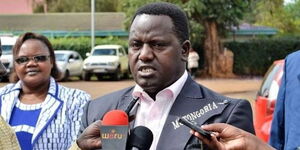The Senate has introduced a new Bill aiming to expand its powers over presidential appointments, enhance legislative authority, and establish new rules for the origination and passage of Bills in Parliament.
The Bill, titled the Constitution of Kenya (Amendment) Bill 2025 (Senate Bills no.13 of 2025), proposes amendments to Articles 157, 215, 228, 229, 233, 250, and 251 to replace many references requiring approval by the National Assembly, so that approvals, vetting, and removal procedures now involve Parliament.
This includes appointments or approval processes for the Directorate of Public Prosecutions (DPP), Commission of Revenue Allocation (CRA) members, the Controller of Budget, the Auditor-General, the composition of the Public Service Commission (PSC), and more.
Additionally, removal petitions for commissioners and holders of independent offices would be submitted to both Houses, not only the National Assembly.
While this could increase scrutiny and legitimacy in appointments, it might also politicise or delay approvals or removals, potentially resulting in longer vacancy periods or partisan hearings.
Another significant provision of the Bill is to rewrite Article 109 to allow Bills to originate from either House. However, Bills on national revenue remain exclusively reserved for the National Assembly. This replaces the previous model, where “most Bills originate in the National Assembly."
Furthermore, the Bill proposes that a Bill be referred to the President only after passing both Houses, as reflected in amendments to Articles 115 and 116. New laws would require joint submission by both Speakers to the President for assent.
A key aspect of the Bill is the proposed restructuring of Article 94, which defines Parliament’s role. The revised version explicitly states that legislative authority at the national level is exercised by both Houses, expanding Parliament’s oversight role.
This is supported by changes to Article 96, which outline the role of the Senate, replacing previous wording with provisions stating that the Senate “deliberates on and resolves issues of concern to the people in counties” and enacts legislation in accordance with Part 4. This aims to strengthen the Senate's legislative standing.
The Bill also seeks to enhance the Senate’s powers concerning county involvement, notably by establishing the County Assembly Fund. The Fund would be managed by county legislation and cover the administrative expenses of county assemblies.
Additionally, the Bill proposes amendments to Article 22 with new clauses allowing counties to withdraw funds from the Consolidated Fund if the Division of Revenue Bill or the County Allocation of Revenue Bill has not been assented to by the start of the financial year, explicitly preventing service interruptions.
If enacted, the Bill will affect Articles 221, 222, and 223 by replacing references to “National Assembly” with “Parliament” in budget processes. Committees from both Houses would review estimates, which, once approved, would be incorporated into an Appropriation Bill.
The Bill also proposes that the Senate acquire the power to originate County Allocation Bills, making it a legislative peer to the National Assembly. This could provide counties with stronger protections and greater influence over the division and use of national revenue, potentially benefiting county service delivery and devolved projects.
Currently, the Bill has passed the First Reading stage, and the Senate has invited the public to comment on it on Monday, October 6.












